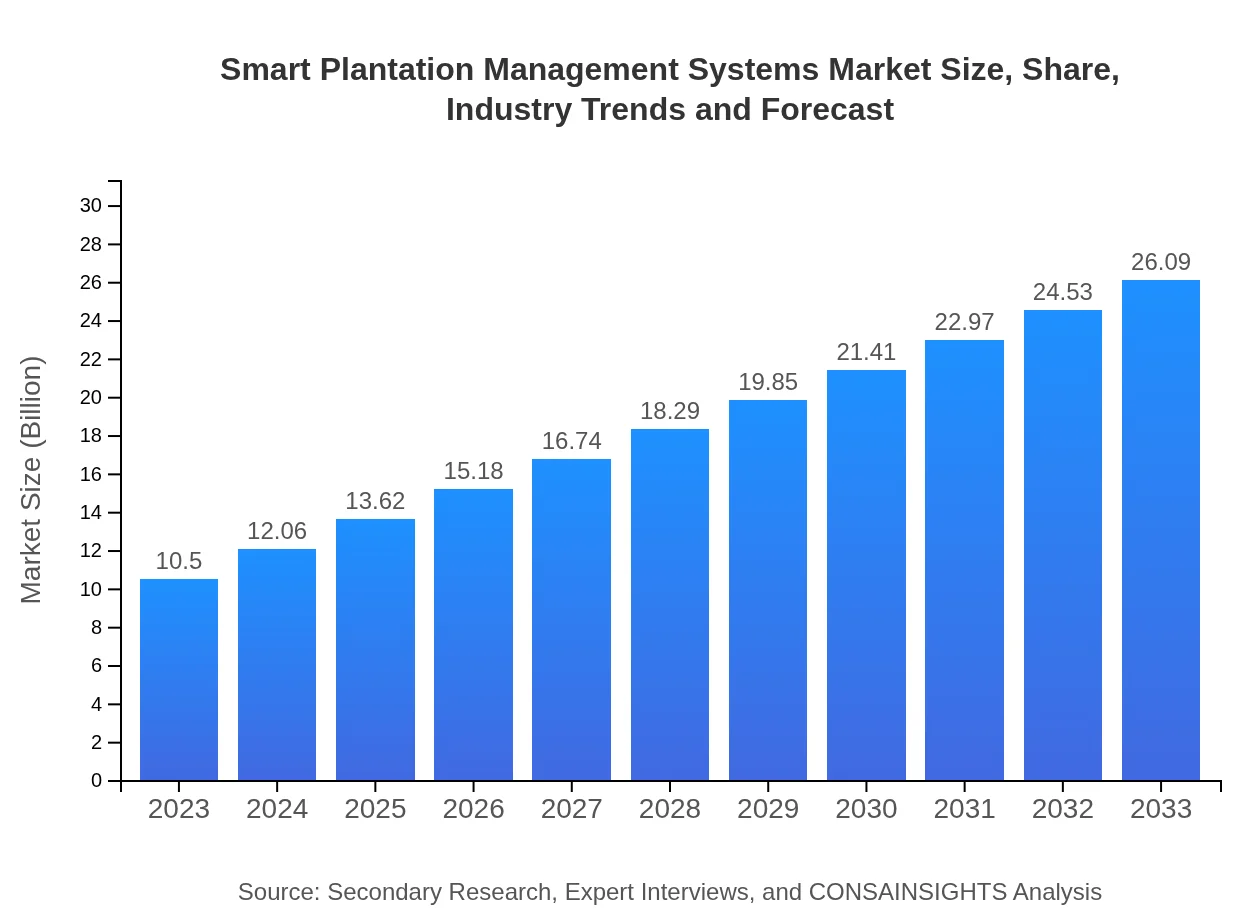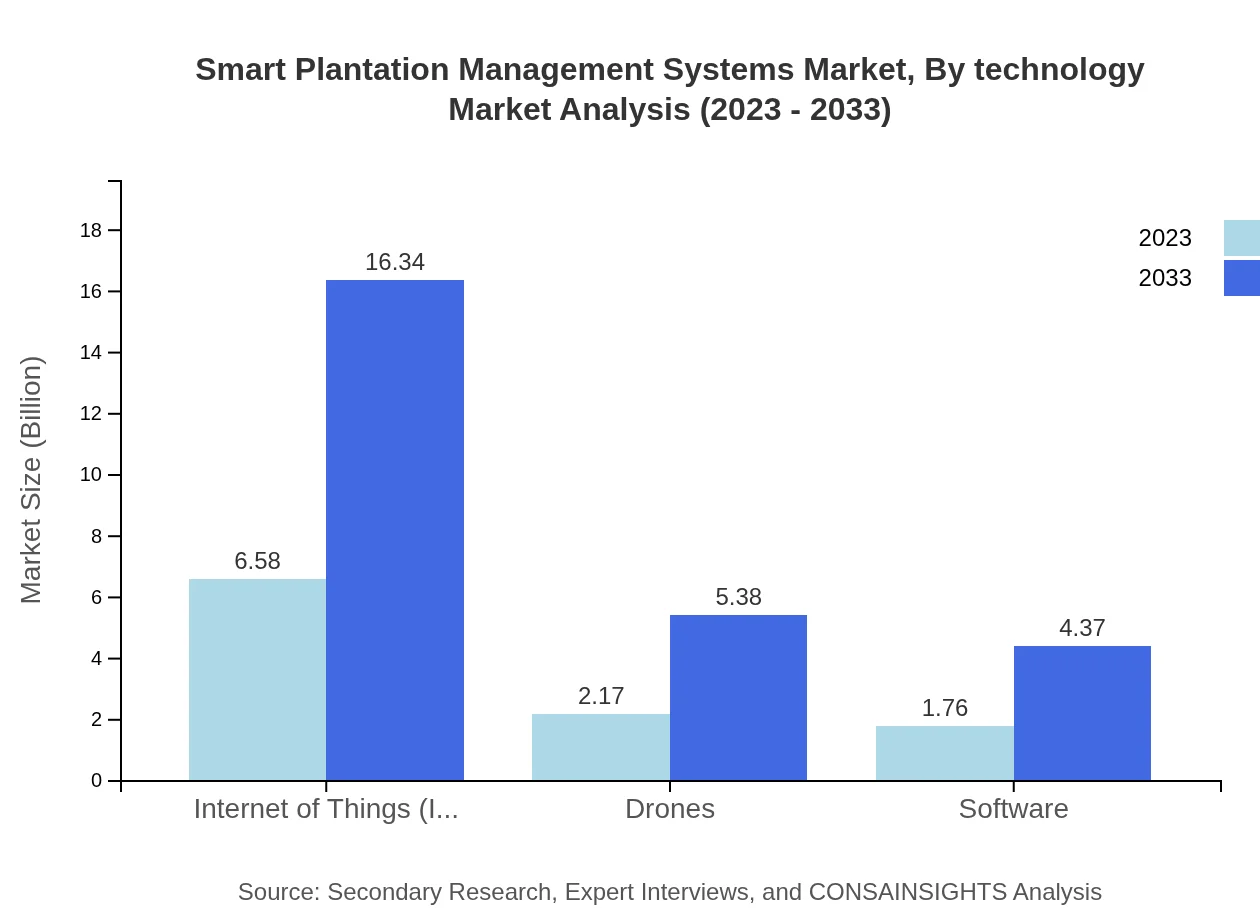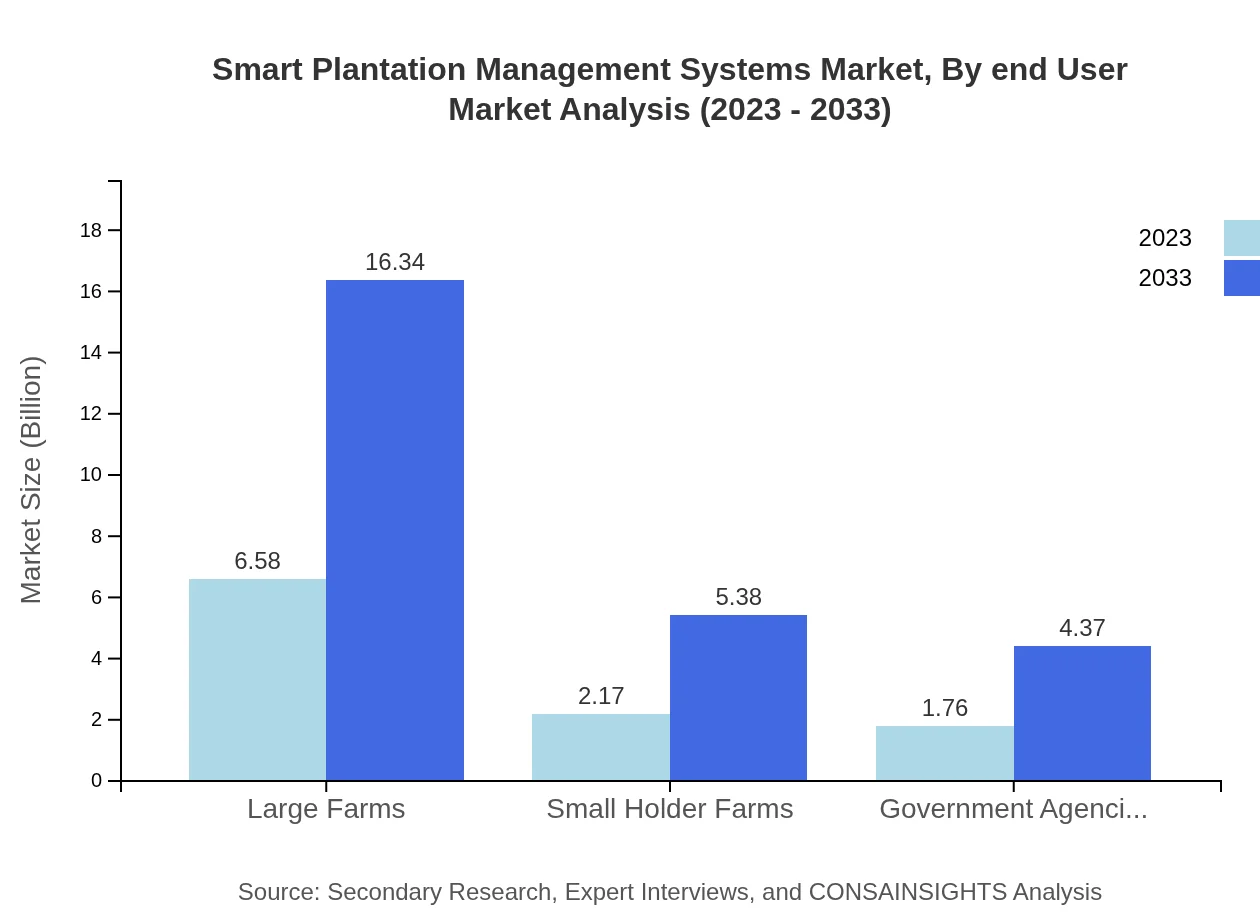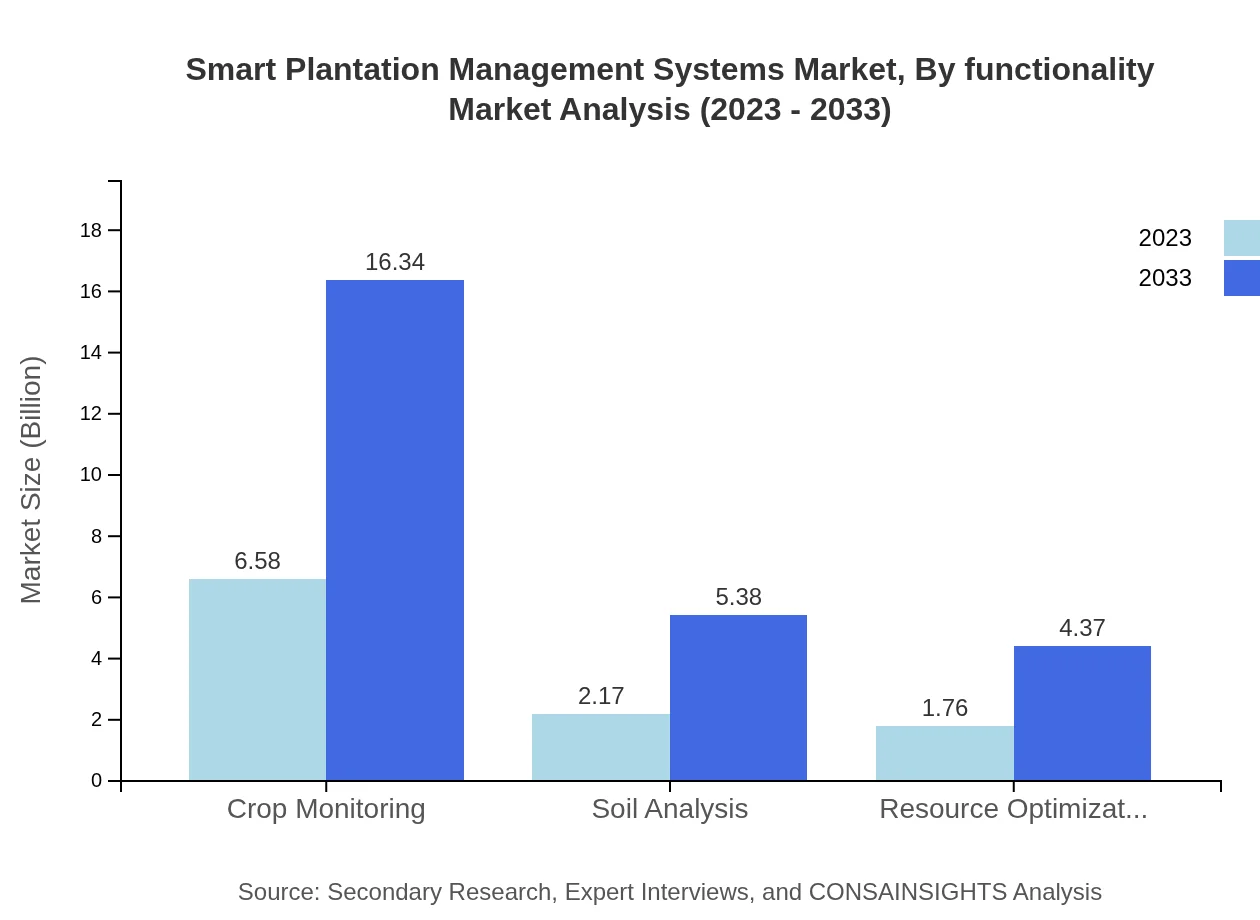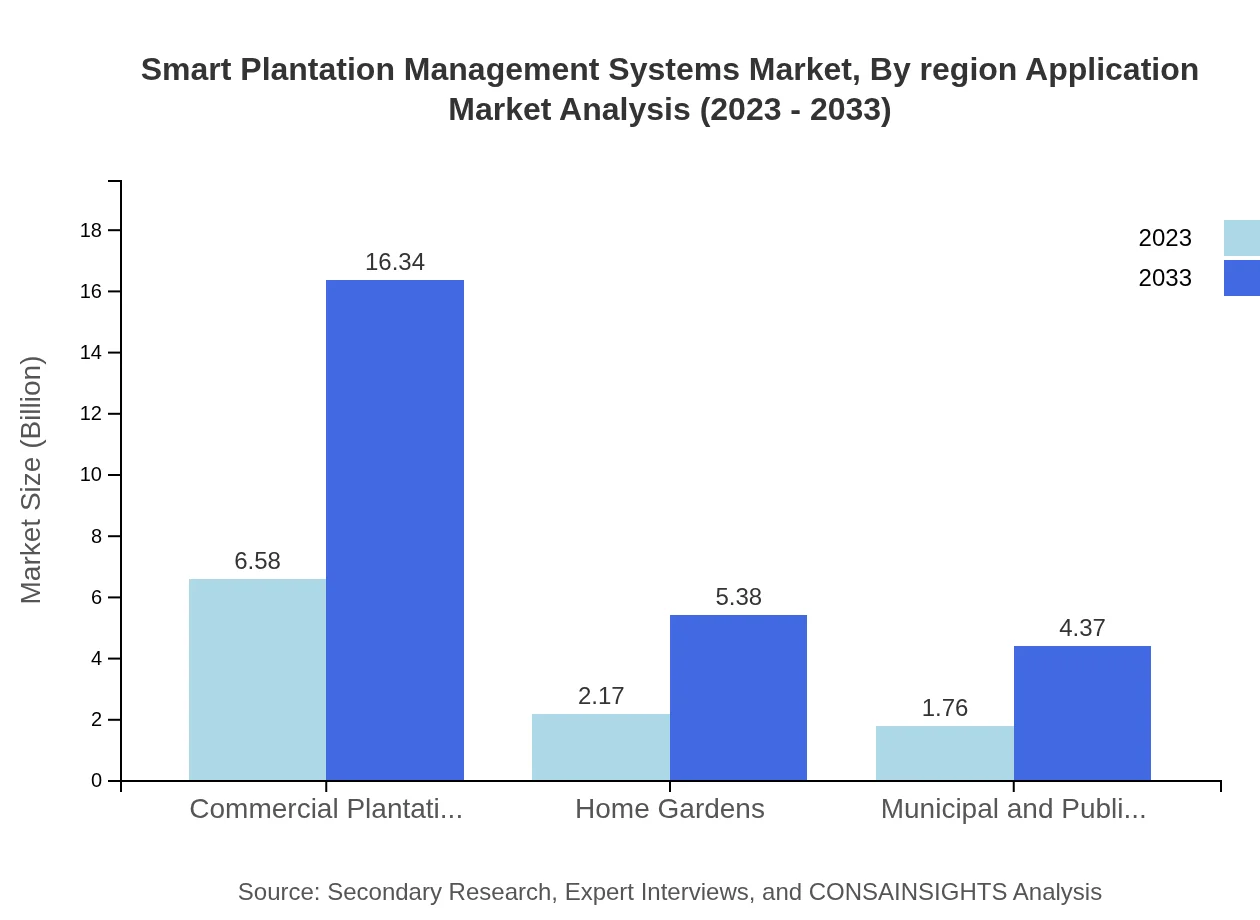Smart Plantation Management Systems Market Report
Published Date: 22 January 2026 | Report Code: smart-plantation-management-systems
Smart Plantation Management Systems Market Size, Share, Industry Trends and Forecast to 2033
This report provides an in-depth analysis of the Smart Plantation Management Systems market, exploring market size, trends, and forecasts from 2023 to 2033. Insights include industry analysis, segmentation, and regional performance, enabling stakeholders to make informed decisions.
| Metric | Value |
|---|---|
| Study Period | 2023 - 2033 |
| 2023 Market Size | $10.50 Billion |
| CAGR (2023-2033) | 9.2% |
| 2033 Market Size | $26.09 Billion |
| Top Companies | John Deere, Trimble Inc., AG Leader Technology, AG Leader Technology, BASF |
| Last Modified Date | 22 January 2026 |
Smart Plantation Management Systems Market Overview
Customize Smart Plantation Management Systems Market Report market research report
- ✔ Get in-depth analysis of Smart Plantation Management Systems market size, growth, and forecasts.
- ✔ Understand Smart Plantation Management Systems's regional dynamics and industry-specific trends.
- ✔ Identify potential applications, end-user demand, and growth segments in Smart Plantation Management Systems
What is the Market Size & CAGR of Smart Plantation Management Systems market in 2023?
Smart Plantation Management Systems Industry Analysis
Smart Plantation Management Systems Market Segmentation and Scope
Tell us your focus area and get a customized research report.
Smart Plantation Management Systems Market Analysis Report by Region
Europe Smart Plantation Management Systems Market Report:
Europe's market stands at $3.25 billion in 2023, with projections of $8.08 billion by 2033. The region emphasizes sustainable agriculture, with significant investments in smart plantation management systems to tackle environmental regulations and food security challenges.Asia Pacific Smart Plantation Management Systems Market Report:
In the Asia Pacific region, the Smart Plantation Management Systems market was valued at $2.00 billion in 2023 and is projected to reach $4.96 billion by 2033. The growth is driven by the increasing adoption of modern agricultural practices and government initiatives promoting smart agriculture in countries like India, China, and Australia.North America Smart Plantation Management Systems Market Report:
The North American market, valued at $3.67 billion in 2023, is anticipated to reach $9.13 billion by 2033. The U.S. is a leader in adopting cutting-edge agricultural technologies, influenced by technological advancements and a push for increased efficiency to meet rising food demands.South America Smart Plantation Management Systems Market Report:
South America’s market was valued at $0.30 billion in 2023, with expectations to grow to $0.75 billion by 2033. Brazil and Argentina are at the forefront of this growth, leveraging technology to enhance agricultural productivity amidst climate challenges.Middle East & Africa Smart Plantation Management Systems Market Report:
The Middle East and Africa market, starting at $1.27 billion in 2023, is expected to grow to $3.17 billion by 2033. Initiatives to enhance agricultural productivity due to arid conditions drive the adoption of smart farming technologies in this region.Tell us your focus area and get a customized research report.
Smart Plantation Management Systems Market Analysis By Technology
The analysis reveals that IoT technology dominates the market with a size of $6.58 billion in 2023 and is expected to rise to $16.34 billion by 2033. Drones also play a significant role, contributing $2.17 billion in 2023 projected to grow to $5.38 billion. Software solutions and sensor technology are essential for enhancing data collection and analysis, marking a shift towards more integrated agricultural practices.
Smart Plantation Management Systems Market Analysis By End User
Large farms represent the largest segment with a market size of $6.58 billion in 2023, maintaining a 62.62% share and expected to grow to $16.34 billion by 2033. Smallholder farms, while smaller in size at $2.17 billion currently, show promise for growth as they increasingly embrace digital solutions. Government agencies are also integrating smart systems to improve resource management and sustainability.
Smart Plantation Management Systems Market Analysis By Functionality
Crop monitoring is the primary functionality, currently valued at $6.58 billion, accounting for 62.62% market share, forecasted to grow to $16.34 billion. Soil analysis and resource optimization functionalities are gaining traction, reflecting the industry's focus on precision agriculture and effective resource management.
Smart Plantation Management Systems Market Analysis By Region Application
Commercial plantations dominate with a size of $6.58 billion and are poised to reach $16.34 billion by 2033. Home gardens and municipal plantations are also growing segments, recognizing the value of smart systems to optimize practices and improve yields at a smaller scale.
Smart Plantation Management Systems Market Trends and Future Forecast
Tell us your focus area and get a customized research report.
Global Market Leaders and Top Companies in Smart Plantation Management Systems Industry
John Deere:
A leader in precision agriculture, John Deere offers advanced smart plantation solutions integrating cutting-edge technology to optimize crop yields and resource usage.Trimble Inc.:
Trimble's innovative solutions in agriculture focus on connectivity and data, enabling farmers to make informed decisions to enhance efficiency across various farming operations.AG Leader Technology:
AG Leader specializes in technology-driven agricultural solutions, providing tools for data collection and analysis to improve farming practices.AG Leader Technology:
AG Leader is known for its high-tech precision agriculture tools, offering software and hardware solutions that streamline farm management.BASF:
BASF integrates technology and research into agriculture solutions, focusing on sustainable practices while enhancing productivity for farmers globally.We're grateful to work with incredible clients.









FAQs
What is the market size of Smart Plantation Management Systems?
The global Smart Plantation Management Systems market is valued at approximately $10.5 billion in 2023, with a projected CAGR of 9.2% through 2033. The market encompasses various segments including large farms, smallholder farms, and government agencies.
What are the key market players or companies in the Smart Plantation Management Systems industry?
Key players in the Smart Plantation Management Systems industry include technology providers and agricultural management software companies that specialize in precision agriculture, IoT solutions, and supply chain management, consistently evolving the market landscape.
What are the primary factors driving the growth in the Smart Plantation Management Systems industry?
Growth is primarily driven by advancements in IoT technology, increasing demand for food security, efficient resource management, and the rising need for sustainable agriculture practices as populations and urbanization rates continue to escalate.
Which region is the fastest Growing in the Smart Plantation Management Systems?
The fastest-growing region for Smart Plantation Management Systems is North America, with a market expected to rise from $3.67 billion in 2023 to $9.13 billion by 2033, reflecting significant investments and adoption rates in smart agriculture.
Does ConsaInsights provide customized market report data for the Smart Plantation Management Systems industry?
Yes, ConsaInsights offers tailored market report data that caters to specific needs and requirements. Customized reports focus on specific regions, technologies, and market segments to provide clients with actionable insights.
What deliverables can I expect from this Smart Plantation Management Systems market research project?
Deliverables typically include comprehensive market analysis, segmentation breakdown, detailed regional insights, trends, forecasts, and strategic recommendations to support informed decision-making and investment strategies.
What are the market trends of Smart Plantation Management Systems?
Current trends include increased automation in agriculture, integration of AI and machine learning for decision-making, enhanced data analytics for crop yield optimization, and rising investments in sustainable farming technologies across diverse regions.

